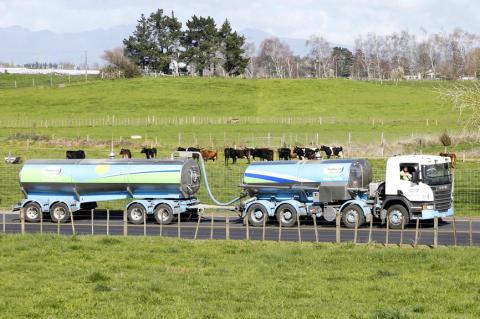French dairy giant Danone SA said yesterday it would sue New Zealand farming cooperative Fonterra for compensation over a botulism scare last year that forced global recalls of baby formula.
Danone said the scare in August last year, which turned out to be a false alarm, had harmed the company and it was launching legal action seeking redress in the New Zealand High Court.
“This affair illustrates serious failings on Fonterra’s part in applying the quality standards required in the food industry,” Danone said in a statement issued by its Paris head office.

Photo: Reuters
Danone did not reveal how much compensation it wanted, saying the figure was a matter for the courts to determine. However, the company estimated late last year that the crisis had cost it 300 million euros (US$407 million).
The company also said it had canceled its supply contract with Fonterra, a grouping of about 13,000 New Zealand farmers that accounts for about a third of the world’s dairy exports.
It did not say how much the supply contract was worth.
Fonterra said it would “vigorously defend” the legal action and was disappointed Danone had abandoned commercial discussions in favor of going to the courts.
“Fonterra stands by its track record of having world-class food safety and quality standards, quality systems and robust testing regimes across all its manufacturing facilities,” it said in a statement.
Fonterra has denied any legal liability for Danone’s losses and said in its accounts last year released in September that it had set aside just NZ$14 million (US$11.6 million) to cover any claims arising from the crisis.
The scare erupted in August last year when Fonterra announced a whey protein used in baby formula and some other products had tested positive for a bacterium linked to botulism, which can cause paralysis or death.
The scare led to infant formula being pulled off shelves from China to Saudi Arabia, before subsequent tests determined the bug was actually another, non-toxic, bacteria strain. Most of the recalled formula tins were Danone brands.

Quanta Computer Inc (廣達) chairman Barry Lam (林百里) is expected to share his views about the artificial intelligence (AI) industry’s prospects during his speech at the company’s 37th anniversary ceremony, as AI servers have become a new growth engine for the equipment manufacturing service provider. Lam’s speech is much anticipated, as Quanta has risen as one of the world’s major AI server suppliers. The company reported a 30 percent year-on-year growth in consolidated revenue to NT$1.41 trillion (US$43.35 billion) last year, thanks to fast-growing demand for servers, especially those with AI capabilities. The company told investors in November last year that

Intel Corp has named Tasha Chuang (莊蓓瑜) to lead Intel Taiwan in a bid to reinforce relations between the company and its Taiwanese partners. The appointment of Chuang as general manager for Intel Taiwan takes effect on Thursday, the firm said in a statement yesterday. Chuang is to lead her team in Taiwan to pursue product development and sales growth in an effort to reinforce the company’s ties with its partners and clients, Intel said. Chuang was previously in charge of managing Intel’s ties with leading Taiwanese PC brand Asustek Computer Inc (華碩), which included helping Asustek strengthen its global businesses, the company

Taiwanese suppliers to Taiwan Semiconductor Manufacturing Co. (TSMC, 台積電) are expected to follow the contract chipmaker’s step to invest in the US, but their relocation may be seven to eight years away, Minister of Economic Affairs J.W. Kuo (郭智輝) said yesterday. When asked by opposition Chinese Nationalist Party (KMT) Legislator Niu Hsu-ting (牛煦庭) in the legislature about growing concerns that TSMC’s huge investments in the US will prompt its suppliers to follow suit, Kuo said based on the chipmaker’s current limited production volume, it is unlikely to lead its supply chain to go there for now. “Unless TSMC completes its planned six

TikTok abounds with viral videos accusing prestigious brands of secretly manufacturing luxury goods in China so they can be sold at cut prices. However, while these “revelations” are spurious, behind them lurks a well-oiled machine for selling counterfeit goods that is making the most of the confusion surrounding trade tariffs. Chinese content creators who portray themselves as workers or subcontractors in the luxury goods business claim that Beijing has lifted confidentiality clauses on local subcontractors as a way to respond to the huge hike in customs duties imposed on China by US President Donald Trump. They say this Chinese decision, of which Agence